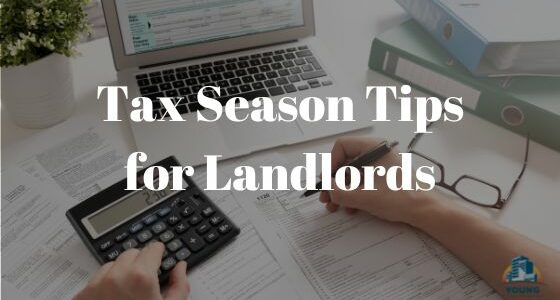The tax season is among the most daunting periods for landlords. It’s your responsibility to make your annual tax declarations plus report your cumulative income from rental activities. It’s an obligation you must take seriously to elude any dispute with the Internal Revenue Service (IRS).
Rental proceeds are the payments you collect from anyone occupying or using your housing unit. It’s not limited to the ordinary monthly charge as it also includes advance rent collections, lease cancellation fees, and any other service or property you receive as rent payment.
No matter if it’s your first time, or you are a veteran in the housing industry, filing your tax returns can be a nerve-wracking experience. Any mistakes can have serious repercussions for your rental involvements. With an in-depth understanding of the process, you can take advantage of several tax incentives to avoid paying more than needed.
This article explores helpful guidelines to enable you to breeze through this tax period and save some money in the process.
Keep Proper Accounts all Year Round
Every landlord should maintain accurate records and keep relevant documents concerning their operations throughout the year. It’s an essential requirement of any property manager, more so, when you intend to claim any tax deductibles. You must maintain proper books for every rental unit under your ownership, including those co-owned with partners or under other businesses.

To avoid overwhelming administrative challenges when filing your returns, get out all the necessary documents in your possession. Maintaining proper records ensures you will trace receipts plus other documents whenever required. In addition, it enables you to file accurate returns and avoid the consequences of declaring inaccurate figures, which include legal liability and a higher tax bill.
The documents you need to have when filing taxes include:
- All lease agreements
- Previous tax declarations
- Legal documents
- Insurance policies
- Loan statements
It’s also vital to retain documentation for all revenues generated and expenditures incurred. They include receipts for utility expenditures, marketing costs, rent payments, professional fees, repairs, and interest on a mortgage. Having those documents easily accessible when you need them makes your tax filing experience more comfortable and straightforward.
Covid-19 Resources
The restrictions put in place and the general uncertainty surrounding the Covid-19 pandemic changed the industry to a large extent. People shifted from physical contact to virtual engagements as they stayed remote with limited movement.
Job losses and moratorium regulations did not help the situation either. Many landlords collected half of the expected rental income during the peak of Covid-19. Though the market remains unpredictable, things are slowly returning to how they used to be before the pandemic.

The government offered a relief package to the tune of $25 billion to landlords and tenants in response to the pandemic’s economic effect on the real estate industry. Even though that package no longer exists, there are resources available. They can be of great help, especially when filing your tax returns.
Check out such resources at Benefits.gov for helpful insight into new opportunities for landlords. You will find numerous resources, including webinars and editorials around landlords’ challenges during the Covid-19 pandemic.
Tax Deductibles
Tax deductibles are expenses that are exempt from taxation and reduce the taxable income amount and the tax amount. Hence, it’s paramount that you take note of all deductible expenses. Below are some tax deductions you should make when filing your annual returns.
Repairs
It’s necessary to carry out repairs to maintain the property in peak condition. Damages cannot be avoided and are bound to happen either by accident or on purpose. Repairing the damage amounts to a deductible cost and includes replacing broken parts, fixing gutters, repairing the roof, painting, and more. However, expenses incurred to upgrade the unit or improve its aesthetic appeal do not fall under the deductible category.
Insurance
Insurance coverage is fundamental to safeguard against any loss or damage arising from unforeseen circumstances such as fire or natural disasters. You should claim the premiums paid by subtracting the total cost from your rental income.

Depreciation
Another cost deductible, according to the Internal Revenue Service (IRS), is depreciation. Where property may be deemed to appreciate, especially where upgrades are done, it’s possible to save some money by claiming depreciation. Unlike other expenses, depreciation is not a one-off expense. The segmented depreciation amount is spread out over several years.
Travel Expenses
Not all landlords live within or around their rental properties. Some manage their properties remotely and only pay visits to the area several times throughout the year. Other property owners have an extensive investment portfolio requiring them to move from one location to another to meet their property management obligations.
All the costs you incur moving from one place to another can be deductible and can help you save some much-needed cash. Traveling expenditures can be car service costs, fuel, hotel charges, accommodation, and airfare.
In Summary
Filing your tax returns does not have to be an intimidating experience. Whether you are a first-time landlord or a seasoned one, following the tips listed above should make your experience smooth and stress-free. If you would like additional assistance, consider hiring a trusted property management company.
With the help of professionals such as Young Management, you can maximize your investment returns by taking advantage of all available avenues to reduce the tax payable. As a top-rated property management company, we have the expertise and hands-on experience to assist you in managing all aspects of your rental property business.
As a property owner, there is no reason you should lose money, whether from tenant turnover, taxes, or vacant houses. With our managers at Young Management, you do not need to worry about such scenarios. We are committed to ensuring you meet all your property investment objectives!

